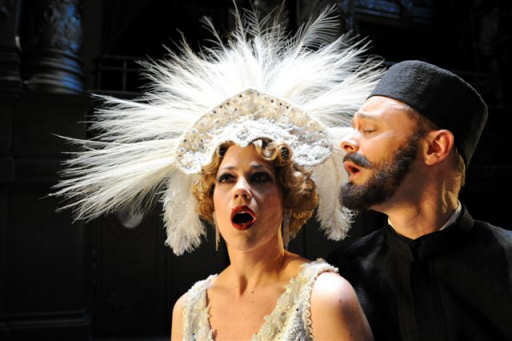Other Links
Editorial Board
-
Editor - Bill Kenny
-
Deputy Editor - Bob Briggs
Founder - Len Mullenger
Google Site Search
SEEN AND HEARD INTERNATIONAL OPERA REVIEW
Massenet, Thaïs: Soloists,
Orchestra of Colors, conductor: Michel Plasson/ Miltos Logiadis,
Megaron, the Athens Concert Hall, 14.3.2009 (BM)
Although Thaïs is one of Massenet's most performed operas, it
is still not part of the standard operatic repertoire, and this is
particularly true of Greece, where opera-goers were likely to be
offered little else that Verdi and Puccini during a typical season
until recently. So many of them must have been pleased when
conductor Michel Plasson stopped over in Athens, since he likes to
say that he travels the world with the best thing his country has to
offer in his luggage: its music. He has described French music as a
delicate flower with an unusual fragrance, quick to wilt, like a
poppy, if it is not picked by sensitive hands, so no doubt he must
have been pleased that the Athens ensemble for this production
included some particularly insightful artists to perform it. On
March 14th, it featured American coloratura Elisabeth
Futral, who was stunning in the notoriously difficult title role,
hitting her brilliant top notes with apparent ease and possessing
the requisite stamina and grace, alongside gifted baritone George
Mosley, blazing and before long smoldering as Athanaël. Miltos
Logiadis conducted the Orchestra of Colors; true to its name, it
brought out the myriad nuances of the score while handling it
delicately and never allowing sentimentality into the equation.

Elisabeth Futral (Thaïs) and George Mosley (Athanaël
Director
Arnaud Bernarnd moved the timeframe up to the early 20th century, but
did so in all modesty and without attempting to alter the essence of the
libretto, based on the novel by Anatole France. Rather, he emphasized its
inherent opposites: the pious and the irreverent, virtue and sin, the luxury of
an Alexandria modeled on 1920’s Paris (in an opulent scene which unfortunately
smacked of Viennese operetta) and the starkness of the desert expressed by Nikos
Petropoulos’ striking minimalist sets.
At a press event prior to opening night, Maestro Plasson also expressed his
gratifying view that a healthy attitude to music should not be an overly
“clever” one, in that too much “intellectual” activity can easily create a
distance to the music itself. It would seem that Bernard shares this view, since
his staging was nothing like one of those cerebral readings that lead audience’s
eyes in a direction no longer compatible with what they are hearing.
Nonetheless, not only did he do justice to Massenet’s anticlerical leanings in a
contemporary and articulate fashion, he also dealt with the issue of repressed
sexuality subtly and to great effect, for once bringing out the almost nihilist
quality of the final scene. And, with a little help from the orchestra, he
reminded us that the best parts of this opera are not necessarily the most well
known (i.e. the famous Méditation for solo violin – which alas was a tad
wobbly and shrill on the evening I attended). Massenet succeeded in displaying
his prodigious musical technique throughout this masterpiece of the romantic
era, especially towards the unforgettable and haunting end, prompting Plasson to
quote André Malraux, who once wrote: “La musique seule peut parler de la mort.”
(Music alone can speak of death.)
Bettina Mara
Picture
© Stefanos
Back
to Top
Cumulative Index Page
